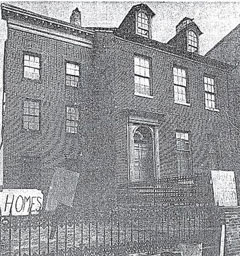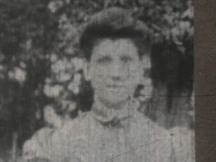
Ridgely's Delight's Stories
While Ridgely's Delight is proud to be the birthplace of Babe Ruth and a resting place for George Washington, our neighborhood has plenty of other interesting tales to tell. We thank both current and former residents for the following information and stories, which bring the earlier days of Ridgely's Delight to life.
Love Is in the Air
Weber’s Wonder
Neighbor Stands Up for Historic Preservation
Mansion Stands the Test of Time
A Ruthian Refuge
Boys Will Be Boys
When the Slave Trade Surrounded Ridgely's
Rolling up the Carpet on Pratt
Share Your Story
Love Is in the Air
Maybe it's the blossoms in spring, or it could be the friendly atmosphere of our neighborhood
because it's not uncommon to find married couples who credit Ridgely's Delight as the place where
they met. Neighborhood romance is not a new phenomenon either. Annie Titlow lived with her parents
at 639 Washington Boulevard in 1907. Her childhood friend lived across the street at 648
Washington Boulevard. Over the years, they became sweethearts, and one day they secretly
traveled to Delaware to marry. They returned from their elopement and continued to live
separately until their secret was discovered weeks later ... and was reported in the newspaper.
The couple's fate is unknown, but it's probably safe to say that their parents were not
pleased by their children's action or the notoriety.
Neighbor Stands Up for Historic Preservation
 Before the Sunoco station became the most modern structure in Ridgely's Delight, the property was
the site of a mansion, built circa 1795, that was considered the second finest house of its period in
Baltimore. The house was known to be a stop on the underground railroad and had a tunnel that ran to
the property known today as Rachael's Dowry.
This 1970 article from The Baltimore Sun
provides more information about the house and one neighbor's brave efforts to rescue it from the developer’s wrecking ball. It also offers a view of the neighborhood before Russell Street, the stadiums and our historic designation.
Before the Sunoco station became the most modern structure in Ridgely's Delight, the property was
the site of a mansion, built circa 1795, that was considered the second finest house of its period in
Baltimore. The house was known to be a stop on the underground railroad and had a tunnel that ran to
the property known today as Rachael's Dowry.
This 1970 article from The Baltimore Sun
provides more information about the house and one neighbor's brave efforts to rescue it from the developer’s wrecking ball. It also offers a view of the neighborhood before Russell Street, the stadiums and our historic designation.
Weber's Wonder
The house at 639 Washington Boulevard is one of the first projects of William Weber a
22-year-old builder from Mississippi. Weber evolved from a master builder into an architect
who designed significant schools, hotels, churches and residences throughout Maryland and DC.
Unfortunately, many of his buildings were destroyed during Baltimore's Great Fire of 1904.
Boys Will Be Boys
 Harry Birmingham patrolled the streets of Ridgely's Delight as a member of the
Baltimore Police in the early 1900s. More than four decades later, he recalled consulting
with Babe Ruth's father, a childhood friend, about the younger Ruth's bad behavior.
Like most boys in the Ridgely’s, then part of Pigtown, Babe was known to roam
the streets, skip school and hide from authority figures in the neighborhood alleys.
In a newspaper article, Birmingham said that Babe “was not a bad boy–just
mischievous. He certainly never gave the police any trouble. But his father decided to
send him to St. Mary’s because he just couldn't make him mind at home.”
Read the full article.
Harry Birmingham patrolled the streets of Ridgely's Delight as a member of the
Baltimore Police in the early 1900s. More than four decades later, he recalled consulting
with Babe Ruth's father, a childhood friend, about the younger Ruth's bad behavior.
Like most boys in the Ridgely’s, then part of Pigtown, Babe was known to roam
the streets, skip school and hide from authority figures in the neighborhood alleys.
In a newspaper article, Birmingham said that Babe “was not a bad boy–just
mischievous. He certainly never gave the police any trouble. But his father decided to
send him to St. Mary’s because he just couldn't make him mind at home.”
Read the full article.
Rolling up the Carpet on Pratt
The building currently standing at 723-725 W. Pratt Street was constructed around 1916-1917, according to information in Baltimore City Directories and Sanborn Insurance Maps. It formerly housed Atlantic Carpet Cleaning and Storage Company. Before vacuum cleaners were invented, the firm took in carpets for cleaning and stored them over the summer. When the weather turned cooler, customers took back their carpets to keep the floors warm, a common Victorian custom. After the invention of the vacuum, the building was sold and later used for furniture storage. The structure was joined by a plumbing supply warehouse on the west and an auto repair shop and machine shop on the east, a sheet metal shop and an artificial flower manufacturer on the southeast corner of what was known as Penn Avenue.
Mansion Stands the Test of Time
 As one of the oldest buildings in the neighborhood, Rachael's Dowry Bed and Breakfast at 637
Washington Boulevard boasts a long and colorful history. The mansion was built by Michael
Warner, after whom Warner Street was named, in 1798. Records show that the building was a
stop on the underground railroad. In addition, Washington visited the Warners often and sought
refuge at their home after injuring his arm while traveling from Baltimore to Alexandria.
A statue of George Washington with his arm in a sling along with two statues of eagles stood
in the front yard until 1972, when an antique dealer bought them for $40 from former owner
Pete Kuchaschus the night before he sold the house. The antique dealer later sold them to the
Smithsonian.
As one of the oldest buildings in the neighborhood, Rachael's Dowry Bed and Breakfast at 637
Washington Boulevard boasts a long and colorful history. The mansion was built by Michael
Warner, after whom Warner Street was named, in 1798. Records show that the building was a
stop on the underground railroad. In addition, Washington visited the Warners often and sought
refuge at their home after injuring his arm while traveling from Baltimore to Alexandria.
A statue of George Washington with his arm in a sling along with two statues of eagles stood
in the front yard until 1972, when an antique dealer bought them for $40 from former owner
Pete Kuchaschus the night before he sold the house. The antique dealer later sold them to the
Smithsonian.
Read Beth Call's account of life in the house during the sixties and seventies and her mother's fight to save the mansion at 615 Washington.
When the Slave Trade Surrounded Ridgely's
Before the Civil War, many slave traders operated in the area around Ridgely's Delight due
to its proximity to the ships at the harbor. From 1818 to 1841, Austin Woolfolk ran his
slave pen, as they were commonly called, on the side of Pratt Street across from Ridgely's,
west of Cove (now Fremont Avenue). Woolfolk marched his slaves, bound in chains,
down Pratt Street during the night. He led them to the wharf in Fell's Point, and loaded
them onto ships bound for New Orleans and other southern ports, where they were sold to
their new owners.
Most families were separated forever after leaving Woolfolk's pen, adding heartbreak to the misery of slavery, which was more than some could bear. One young woman took her and her child's life in Woolfolk's pen in the spring of 1826, rather than go south. In 1821, a man slit his own throat at the wharf after learning that he had been sold to a trader.
Read about a mutiny that occurred aboard a ship that carried Woolfolk's slaves in 1826.
A Ruthian Refuge
 Ridgely's Delight is most famous for being the birthplace of Babe Ruth, but it's also
where his mother died. Catherine Schamberger Ruth died of tuberculosis when the Babe
was a teenager moving back and forth between St. Mary's Industrial School and one of
the bars his father ran. Her sister, Lena Fell, took care of her during her last days
in her house at 712 Portland Street, where her wake also took place. She rested in an
unmarked grave until 2008, when the Babe Ruth Museum provided funds for a headstone.
Read more about Mrs. Ruth.
Ridgely's Delight is most famous for being the birthplace of Babe Ruth, but it's also
where his mother died. Catherine Schamberger Ruth died of tuberculosis when the Babe
was a teenager moving back and forth between St. Mary's Industrial School and one of
the bars his father ran. Her sister, Lena Fell, took care of her during her last days
in her house at 712 Portland Street, where her wake also took place. She rested in an
unmarked grave until 2008, when the Babe Ruth Museum provided funds for a headstone.
Read more about Mrs. Ruth.
Share this site.
Photos ©Joanne Drummond. All rights reserved. Reproduction or downloading without permission is prohibited and is a violation of federal law.

